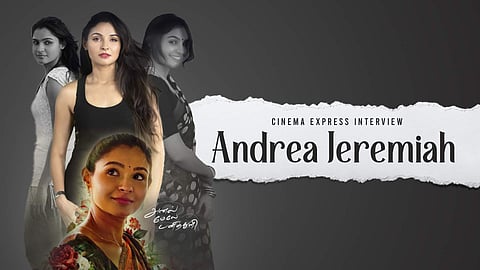

It’s safe to say that 2022 not only pulled the pandemic-hit Indian cinema back on track with multiple blockbusters but also provided an empowering scope to tell tales of women. Be it Alia Bhatt’s Gangubai Kathiawadi and Darlings, Aishwarya Lekshmi’s Ammu, Sai Pallavi's Gargi, and the recently released Darshana Rajendran-starrer Jaya Jaya Jaya Jaya Hey, stories that portray the resilience of women against oppression/abuse, rightly evoked a sense of unease, while also empathising with the survivors, who stood up for themselves. In line with this is Andrea's Anel Meley Pani Thuli (AMPT), starring Andrea Jeremiah, which tells a rape survivor’s tale.
Calling it an empowering story, Andrea shares, “Even when we talk about such incidents, we still refer to them as 'victims'. Referring to them as survivors is a recent phenomenon. Most women are victimised by their families. In fact, I'd pick being murdered over being raped because of the stigmas associated with the latter. AMPT is a script that showcases the importance of empowering women to ensure they neither victimise themselves nor allow anybody to paint them as one."
Andrea also shares her observation on the rise of woman-led scripts and how actors are no longer just the 'heroines' of other projects, but protagonists of their own films. “We have finally reached a place where people are open to different kinds of storytelling, and they will watch good content irrelevant of who is headlining it,” says a confident Andrea.
In AMPT, Andrea plays Madhi, a small-town girl, who comes to the city with many dreams. The actor shares that the film allowed her to break the stereotype of her being an upscale and urban girl. Hailing from the small town of Arakkonam, Andrea paints a picture of her childhood village life with paddy fields, a bougainvillea tree, sand mounds, tire swings, and a tamarind tree, “At heart, there is still a small-town girl side to me. I never get to play those roles, because I don’t 'look' that part. Only the Malayalam film Annayum Rasoolum (2013) gave me a chance to be in that space. After that, AMPT offered me that opportunity," the actor shares.
While AMPT may be one of the few roles that have Andrea playing a small-town girl, the actor has sizeable credits for playing well-written women onscreen—Chandra (Vada Chennai), Lavanya (Aayirathil Oruvan) and Althea (Taramani), to name a few. “For me, Taramani is the most well-written, author-backed role I have done. Ram sir is a feminist, and he writes so beautifully for women. People also look at me as bold and strong, but there is a well of vulnerability from which you draw strength. A role can last 10 minutes or appear for the entire runtime, but what is more important is the intent of the character.”
Apart from her career as an actor, Andrea has a prolific body of work as a voice actor too. She firmly believes the right voice has the power to change a whole scene. “I find it fairly easy and enjoyable to dub for myself. I dubbed for myself in Telugu for the first time for Pisasu 2 and that was a learning experience,” says Andrea. However, on the flip side, she also reveals how in certain instances, dubbing can be traumatic, like reliving traumatic scenes. Recalling one such incident from AMPT, Andrea narrates, “We knew shooting a particular scene would be difficult but it was even more affecting than we expected. I broke down and I had to talk to a counselor because of the PTSD-related effects. At the end of the day, I was not getting affected just as an actor, but as a woman too. But while I was being safe on the sets, in the real world, women go through this in a brutal way. That shook me up.”
After treading on heavier topics, we veer towards a lighter and more joyful note of Andrea completing 15 years as an actor since her debut in Pachaikili Muthucharam (2007). As Andrea breaks into laughter upon hearing the observation, she says, “I have a love-hate relationship with camera. When I started out, I was a reluctant actor and I had time to fine-tune my craft over the years. I am in that space where I am more interested in the process and techniques.”
Having played a myriad of roles in cinema, Andrea hopes to leave a legacy of work that she can be proud of. Acknowledging that financial independence is important, she notes, “In the process, if I manage to inspire women, that would mean something. Films are powerful because they have the power to change the way a generation thinks. If I had to choose between being paid extraordinarily well for films I don't care about or not receiving that level of pay for films I care about, I would always go with the latter.”